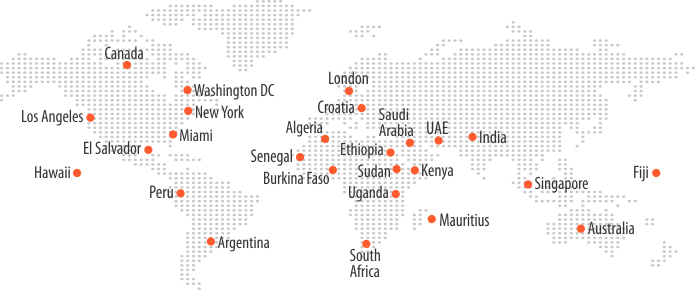Redefine Customer Support Excellence with VoIP: The Ultimate Guide

VoIP, or Voice over Internet Protocol, is used by high-performing customer support teams to improve training, increase operational efficiency, communicate more effectively, and boost customer engagement. Customer support executives are equipped with the tools they need to deliver excellent customer experience by integrating VoIP with business CRM and other digital platforms.
Customer expectations are growing as the world is increasingly getting smaller and more businesses are going global. The customer support team is, without a doubt, a company’s front line in the modern era. Effective customer management is their responsibility. They can make or break an organization depending on how they handle customer engagement channels. Customer experience is unquestionably the focus of interactions with customers, and VoIP is the solution for a seamless client experience over the phone.
Businesses that use VoIP can save more money by getting rid of bulky desk phones, and there are no additional costs for long-distance calls. This voice technology alternative to regular phones is more responsive and adaptable. To scale customer support/service teams up or down without purchasing additional technology, any customer support agent with an internet connection can use VoIP.
How VoIP Helps to Enhance Customer Experience?
In terms of customer service, one thing stays the same; even as technology changes, phones are not going to disappear. Most service industry experts assert that telephone customer care will always play a crucial role, and by integrating VoIP with the tech stack, organizations may drastically alter how a customer care team interacts with clients on the phone. Client service representatives can deliver better, more personalized customer experiences and resolve complicated problems faster than anyone ever imagined possible by integrating VoIP with business CRM.
Here are the top ways VoIP helps to optimize customer experience:
Cater to Growing Customer Expectations
Customers now have far higher expectations for support services. They now anticipate businesses to have a 24/7 online presence, and they also have a growing lack of tolerance for waiting to get their desired items.
A business can outsource customer assistance to any location in the world using VoIP phones. The customer doesn’t care whether the staff is working remotely or at a contact center because they all use the same phone number. Wherever they are, a consumer can call a local number to connect with a customer support agent.
Answer Every Customer Call
VoIP networks can aid in achieving the objective of never having a customer call go unanswered. By setting up VoIP systems to transmit calls to outside organizations, businesses can disperse their work throughout the globe.
When no customer support agents are available, phones can be configured to offer a callback to the customer. Voicemail takes up more time. Thus, callback services are a well-liked solution. The ideal scenario for businesses is to never keep a consumer on hold for more than 20 to 30 seconds without providing a callback.
If one individual or the customer support team is over-reached, the VoIP phone system can attempt multiple numbers at once and connect the consumer to one that is open. Customers can reach a real person and get service right away by having calls forwarded to other staff members. The number of customers that give up or hang up and don’t call back reduces because of shorter wait times.
Lower Call Waiting
Hold on, please. After a few minutes of awkward quiet, and boring background music, a staff member abruptly informs the customer that they must transfer them to another customer support agent. This experience of call transfers and call drops is the most aggravating as the customer must reiterate their experience to each new agent they speak with. For both the consumer and the employees, this is a terrible waste of time.
VoIP provides two options to solve this issue: Interactive Voice Response (IVR) and Auto Assistant. Even if no one is immediately available to talk with the customer, these make sure their call is answered soon away. It’s similar to having a virtual assistant who can answer the phone and carry out voice commands to make sure the customer speaks to the appropriate employee when they first pick up the phone.
Improved Call Quality
VoIP phone calls have superb clarity and have evolved much better over time. The expanded frequency range compared to analog phones is what makes for a superior customer experience. A business-class broadband connection that prioritizes voice over data is necessary to ensure optimal quality, as call clarity is directly connected to broadband quality. The fact that the service has improved without increasing prices is an added advantage.
Quality Assurance
Training an agent to deliver outstanding service over the phone is an investment that will benefit the organization for as long as that agent works for it because the phone will always be a crucial component of customer service. VoIP technology streamlines the training process and provides management with additional data and insight to enable the customer support team to provide excellent customer care over the phone. With the use of VoIP and other digital platforms, management has additional resources at their disposal to enhance efforts at quality assurance.
Optimize Customer Support Interactions
Organizations that interact directly with consumers are relied upon to keep track of significant customer touchpoints, recollect information to keep customers informed and use the most effective problem-solving techniques. VoIP can seamlessly integrate with the CRM, sales, productivity, communication, and customer service tools to optimize all of these processes and let customer support agents serve customers more efficiently.
With VoIP – CRM integration, the customer support team always has a complete picture of the customer’s experience because customer touchpoints are immediately logged under their customer profile. Support staff doesn’t have to rely solely on customers to provide all the information for open cases. They will have immediate access to all the information they require.
Because notes are automatically recorded, there is less chance of human error when agents are taking notes and helping clients at the same time. So that no information is ever missed, and entire phone calls can be transcribed. Hold times and consumer discomfort is decreased since customer support agents can quickly access key customer information on a single screen.
VoIP is the Way Forward to Drive Customer Care
The bottom line of the company will benefit from improving the customer experience. Customers will switch to other businesses if they have poor experience or have to wait for a long period. By promptly responding to calls, effectively addressing customer inquiries, and developing customer service aces among its staff, a business can enhance the quality of the services it offers. All these enhancements are feasible and can be strengthened by the customer support team’s use of an ideal VoIP service provider.
Bankai Group is one of the world’s leading providers of retail and wholesale VoIP call termination services. We comprehend that consumers require dependable and adaptable technical support resources in order to maintain their systems and continue offering their clients top-notch offerings. Our staff of skilled and experienced experts promptly resolves all of our customers’ technical concerns. In addition, we provide quality assurance, alert systems, and real-time monitoring to ensure optimum accuracy.
Related Posts
6 Steps to Change Your VoIP Provider for Better
Powerful VoIP Switch Features We Are Betting On






